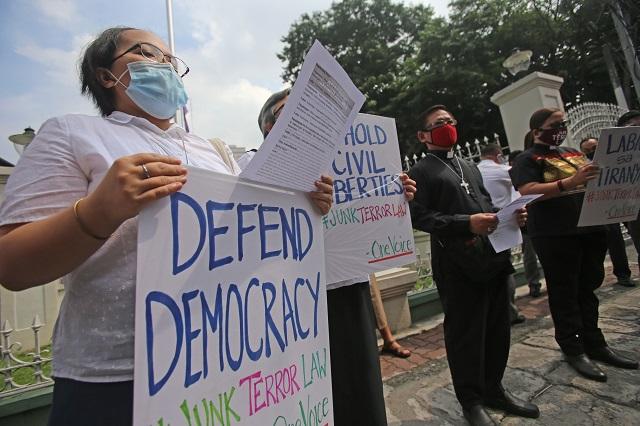Religious group's assets frozen in 'prelude' to anti-terror law cases

A court has ordered the freezing of the assets of a progressive religious group for alleged terrorism financing, in what the organization says is a test case warning of charges to be filed under the anti-terrorism law.
The Manila Regional Trial Court last month issued an asset preservation order (APO) against the Rural Missionaries of the Philippines' (RMP) bank accounts, which were allegedly used to fund activities of the New People's Army.
The government has initiated a civil forfeiture case against the RMP.
The RMP is one of the many organizations asking that the anti-terrorism law be struck down, fearing that it will be used by the state to go after its critics by tagging them as communist rebels or fronts.
The RMP along with its co-petitioners in the religious sector told the Supreme Court (SC) of the APO in a manifestation filed Monday, in compliance with the court's order for the parties to inform it of developments relevant to the case.
They said the "unprecedented filing of a case against a known progressive religious organization" relied largely on the testimonies of two supposed former CPP-NPA members who surrendered to the government.
"Supporting their statements linking the funds to the CPP-NPA were voluminous pages of bank documents which merely show legitimate financial transactions of an organization on their administrative and operational expenses," the petitioners said.
"Thus, it is most deplorable that an APO was issued on October 7, 2020 in this test-case preluding the cases to be filed under the Anti-Terrorism Law," they added.
The RMP has challenged the APO before the Manila RTC.
But even while that is pending, the RMP said intelligence and anti-communist insurgency officials have already "maliciously and publicly maligned" their group "as a terrorist organization or a supporter of a terrorist organization."
The petitioners told the SC of the statements of Lt. Gen. Antonio Parlade, National Security Adviser Hermogenes Esperon, and intelligence chief Alex Paul Monteagudo at a Senate hearing on "red-tagging."
"Under these circumstances, the designation as a terrorist organization of the Petitioners is not just a possibility, it is a foregone conclusion unless the Honorable Court declares the ATA (Anti-Terrorism Act) as unconstitutional," they said.
Another set of petitioners on Wednesday informed the SC of the case of two Aetas who were allegedly wrongly charged under the anti-terrorism law. They said this is the first publicly known case where the implementation of the law violated a person's rights.
Several groups challenging the law before the SC have complained of "red-tagging," or the practice of labelling a person or an organization as a communist rebel or front, saying this endangers their lives.
President Rodrigo Duterte has proclaimed the CPP-NPA as a terrorist group after failed peace talks with the left but for the group to be officially outlawed requires a court declaration.
A petition for the proscription of the CPP-NPA has been pending with a Manila court since 2018.
The SC has scheduled a preliminary conference on the anti-terrorism law petitions for November 26. There is no date yet for oral arguments.
The law has been in effect since July. Its implementing rules and regulations were promulgated in October.—AOL, GMA News



